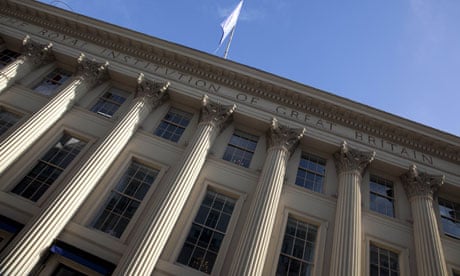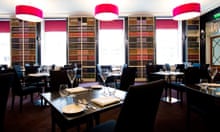The Royal Institution's building in Mayfair – the place where 10 chemical elements were discovered and where Michael Faraday first demonstrated the power of electricity – has been put up for sale in an attempt to cover the charity's mounting debts.
Scientists responded with shock that potential buyers had been shown around the RI's imposing, grade I listed building on Albemarle Street in central London, with a view to selling the property for more than £60m.
"We're going to lose the [scientific] equivalent of Shakespeare's Globe," said Lisa Jardine, professor of renaissance studies at University College London and a former trustee of the RI, which was founded in 1799 to carry out basic scientific research and support public engagement with science through lectures and demonstrations.
"This is a huge part of our scientific heritage. They haven't consulted anybody, they're talking about selling it off as if it were a business deal. It absolutely breaks my heart."
The RI has been in financial trouble ever since the completion of a £22m refurbishment of its building in 2008. The project, which included a fine-dining restaurant, was intended to modernise the institution and turn it into a "salon" for science to attract a wider audience. The subsequent economic downturn, however, meant that there were never enough visitors to pay for the organisation's running costs. It now owes creditors about £7m.
The physicist and broadcaster Jim al-Khalili said that many people in the science community had been aware of the financial troubles at the RI, but no one had foreseen the possibility that its building would be sold off. "It seems crazy that at a time when science and science communication is riding a wave of popularity not seen for generations, we hear that the very epitome of a British scientific institution is under threat."
Professor Martyn Poliakoff, foreign secretary of the Royal Society, said it would be a tragedy if the RI's building were lost to science. "It is part of our proud scientific heritage and a reminder of when science was very much at the heart of our culture.
"People get a real buzz from going into a building and knowing that Faraday worked there. It is important that as a nation we do as much as we can to maintain our scientific heritage."
In a statement, the institute's chairman, Sir Richard Sykes, said that the redevelopment of the building had undermined the financial position of the organisation. "The RI and its advisers are exploring a range of options to ensure it can continue to pursue fully its charitable aims and deploy its resources optimally.
"It is clear that this is likely to involve a restructuring of the charity and, ideally, a substantial partnership. It may also involve the RI sub-letting or disposing of some or all of its Albemarle Street property."
In 2008, the RI sold off several of its properties in Mayfair to fund its ambitious refurbishment, which was also supported with a grant from the Heritage Lottery Fund. "But what they had underestimated was that the houses they sold had been let at top-dollar rent and they had also funded their activities out of the interest on investments," said Jardine. "Like everyone else, once the boom was over, that left them with not enough running costs. They've been running up debts with the bank ever since – they didn't get around to restructuring early enough."
In 2010, the trustees forced the RI's then director, Lady (Susan) Greenfield, to leave her post, an indication that many of them felt she was to blame for the financial problems. Greenfield subsequently brought legal proceedings against the RI, claiming she had been the victim of sexual discrimination, but later settled out of court.
Greenfield said on Friday that she was "deeply saddened" about the potential sale and that the charity's financial problems were not so much a result of committment to the refurbishment work as to do with how the organisation had dealt with the situation afterwards.
"My own view is that, rather than spending time and energy making the directorship post redundant, perhaps had we all pulled together to fundraise, one could have overcome the recession, which no-one could have foreseen anyway."
Oxford University neuroscientist Colin Blakemore said that the Ri had invented science communication, but that there are now a multitude of other organisations that do the same things, sometimes better and usually more cheaply. "Nevertheless, the loss of this icon of public science would be a tragic signal that Britain no longer values its unique contribution to history. A fraction of the cost of a Picasso or a football club would save this venerable institution. Surely there's a benefactor out there who wants to secure a place in history by rescuing it?"
Al-Khalili added: "We need to mobilise a national campaign to raise the necessary funds to save it. I have had the privilege of giving many lectures in its famous theatre - indeed with another one coming up next week. It is truly one of the most inspirational places in the world to lecture in and one is constantly aware of the ghosts of Humphry Davy and Michael Faraday looking down."







Comments (…)
Sign in or create your Guardian account to join the discussion